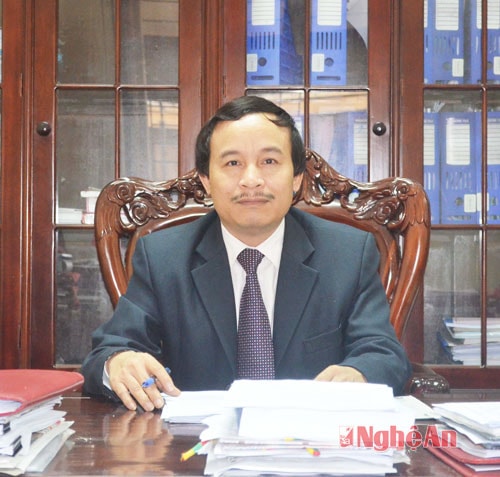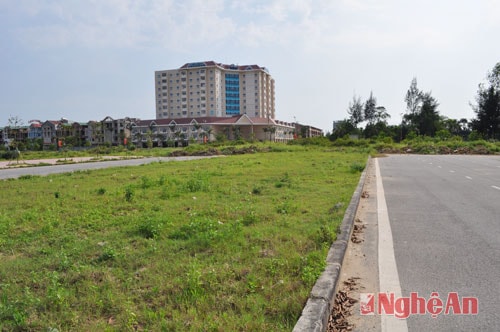Land Law 2013: Fundamentally limiting shortcomings
(Baonghean) - The 2013 Land Law was passed by the National Assembly on November 29, 2013 and will take effect on July 1, 2014. Nghe An Newspaper reporter had an interview with comrade Vo Duy Viet - Provincial Party Committee member, Director of the Department of Natural Resources and Environment about some issues surrounding this law.
PV:Dear comrade! What are your comments on the 2013 Land Law?
Comrade Vo Duy Viet:This is a bill that has been carefully and seriously prepared, based on the results.
 |
| Comrade Vo Duy Viet. |
PV:According to the Ministry of Natural Resources and Environment, the 2013 Land Law stipulates more specifically the rights and obligations of land users; further enhances publicity, transparency and democracy in land use management; pays more attention to ensuring land use rights for vulnerable groups such as women, the poor, ethnic minorities... Can you analyze this issue more clearly?
Comrade Vo Duy Viet:The 2013 Land Law has 9 important innovations as follows:
1. More specifically stipulate the rights and responsibilities of the State, the State's guarantees for land users; the rights and obligations of land users in accordance with each subject, each form of land use and the conditions for exercising the rights of land users.
2. Continue to improve land policies and laws for the agricultural sector to facilitate the acceleration of the industrialization and modernization of agriculture and rural areas; while ensuring the goals of national food security and environmental protection.
3. Pay attention to land quality issues, innovate land use planning and plans to meet land management requirements of each administrative level, and at the same time contribute to better exploitation of land resources.
 |
| Land planned for housing in Le Loi ward (Vinh city). Photo: HV |
4. Strengthen the operation of land relations according to market mechanisms, moving towards eliminating subsidies in land management and use.
5. Improve the mechanism to promote land resources through regulations on the State proactively reclaiming land according to land use plans.
6. Strengthening publicity, transparency and democracy in land management and use.
7. Establish equality in land access, land use rights and obligations between domestic and foreign investors in accordance with integration requirements and investment attraction.
8. Pay more attention to ensuring land use rights for vulnerable groups such as women, the poor, and ethnic minorities.
9. Legalize and specify in the Law many contents, especially contents related to the rights and interests of land users such as land recovery, compensation, support, resettlement, granting of Certificates of land use rights, house ownership rights and other assets attached to land.
The above contents have affirmed that, with what is stated in the 2013 amended Land Law, it has clearly shown the viewpoint of our Party and State, on the one hand affirming the rights of the State, on the other hand paying close attention to the rights and interests of all classes of people. A very clear example is the change in the term of agricultural land allocation. Previously, agricultural land users were allocated land for a term of 20 years. According to Article 126, Section 1, Chapter X on land use regime of the 2013 Land Law, the term of land allocation and recognition of land use rights for households and individuals directly involved in production is up to 50 years. This is a very long period of time. With this period of time, households and individuals directly involved in production are truly the owners of the land area allocated by the competent authority. They and the next generations will be attached to the land, confidently investing in long-term effective cultivation.
This is also reflected in the provisions on compensation when the State reclaims land. The 2003 Land Law only has 2 articles (Article 42 and Article 43) regulating compensation, support and resettlement for people whose land is reclaimed. Now the Land Law has devoted 2 sections with 21 articles (from Article 74 to Article 94) to regulate compensation, support and resettlement when the State reclaims land. The provisions are quite specific, detailed and realistic for people who are granted land use rights.
From the specific regulations on land compensation principles when the State recovers land such as: land users when the State recovers land, if they meet the conditions, will be compensated by being allocated new land with the same purpose of use as the recovered land type. If there is no land for compensation, they will be compensated in cash according to the specific land price of the recovered land type; compensation and resettlement when the State recovers land must ensure democracy, objectivity, fairness, publicity and compliance with the provisions of law; the agency responsible for paying compensation must pay promptly to the person whose land is recovered (Article 74). Or regarding the conditions for land compensation when the State recovers land, the Law has added the case of "using leased land and paying land rent at once for the entire lease term" to be compensated for land when the State recovers land (Article 75). Or as for the land price regulations, the land price for calculating compensation is determined according to the land use purpose at the time of the land recovery decision...
I can give another example to affirm the close attention of the Party and State to all classes of people, that is, at Point b, c, Clause 1, Article 110, Chapter VIII on finance and land prices of the 2013 Land Law, there are additional cases of exemption and reduction of land use fees and land rent, including: using land to implement housing and residential land policies for people with revolutionary contributions, poor households, households and individuals of ethnic minorities in areas with particularly difficult socio-economic conditions, border areas and islands; using land to build social housing; residential land for people who have to relocate when the State reclaims land due to risks threatening human life; using agricultural land for ethnic minorities...
PV:It is known that in recent years in our province, complaints related to land issues have accounted for the majority, from 80 to 90%. There are many reasons, but one of them is due to the 2003 Land Law and a number of related decrees, circulars, regulations... which still have inappropriate points, even overlapping. May I ask you, comrade, can the 2013 Land Law resolve the above issue?
Comrade Vo Duy Viet:The 2013 Land Law clearly stipulates the rights and obligations of land users; the responsibilities of management agencies and land-related issues. In addition, the Law also devotes a chapter with 2 sections and 12 articles to regulating supervision, inspection, dispute settlement, complaints, denunciations and handling of violations of land law (Chapter XIII). In particular, it regulates supervision by the National Assembly, People's Councils at all levels, the Vietnam Fatherland Front, and member organizations of the Front on land management and use; citizens' supervision of land management and use; and the monitoring and evaluation system for land management and use.
Regulations on specialized land inspection; land dispute mediation; regulations on the authority to resolve land disputes; settlement of complaints and lawsuits on land; settlement of denunciations on land; handling of people who violate land laws; handling of people who violate land laws when performing official duties in the land sector; on the responsibilities of Chairmen of People's Committees at all levels in detecting, preventing and handling violations of laws on land management and use... I believe that with such detailed provisions of the Law, the shortcomings of the 2003 Land Law and a number of related decrees, circulars, regulations... will be limited. Thereby, the number of land-related complaints and lawsuits will be resolved and reduced.
PV:The Land Law is one of the laws that attracts the attention of the whole society. Through the discussion, we see that the propaganda and dissemination of the law needs to be promoted. Could you tell us what the Department of Natural Resources and Environment will do to disseminate the 2013 Land Law to all people in the province?
Comrade Vo Duy Viet: Since the end of 2013, the Department of Natural Resources and Environment has identified the dissemination and implementation of the 2013 Land Law as a key task throughout 2014. Right from the beginning of the year, the Department of Natural Resources and Environment has invited the Land Policy Department of the General Department of Land Management - Ministry of Natural Resources and Environment (a member of the Land Law Drafting Committee) and is the first province in the country to provide step 1 training for officials working on environmental management at the provincial, district, city, town levels, and related departments, branches and sectors. In the coming time, the Department of Natural Resources and Environment will coordinate with districts, cities and towns to continue organizing training on the 2013 Land Law to grassroots officials; thereby, widely disseminating the Law on Land to all classes of people. In the work of disseminating and disseminating the Law on Land, it is impossible not to mention the role of media agencies. The Department of Natural Resources and Environment hopes that with the synchronous participation of all levels and sectors, and the participation of newspapers and radio, the 2013 Land Law will truly come into life, contributing to the economic and social development of the province.
PV:Thank you for taking the time to conduct this interview with Nghe An Newspaper!
Nhat Lan
